With the 2024 Olympics finally upon us, let's take a look back on Ireland's greatest Olympians.
Pat O'Callaghan
Gold medals in 1928 and 1932
When he won gold in the hammer throw at the 1928 Olympics in Amsterdam, Pat O’Callaghan became the first athlete from an independent Ireland to become an Olympic champion.
According to research by the historian Paul Rouse, O’Callaghan greeted his victory with the declaration that "the world has been shown that Ireland has a flag, that Ireland has a national anthem, and, in fact, we have a nationality."
The importance of O’Callaghan’s breakthrough was recognised by the fledgling Irish State, and his triumph then, and again in 1932 when he won gold in the hammer once more, were causes for national celebration.
He was an extraordinary figure, and has good claim on being considered Ireland’s greatest Olympian.
He was born, the second of three sons, on a modest farm near Kanturk, Co Cork in 1906. He was academically gifted, graduating as Ireland’s youngest doctor at the age of 20.
He was effectively self-taught in the hammer, initially using an old cannon ball to practice on the family farm.
His second gold, in Los Angeles in 1932, came about only after he had to file down the spikes on his shoes as he was in acute discomfort in the opening rounds of the event.
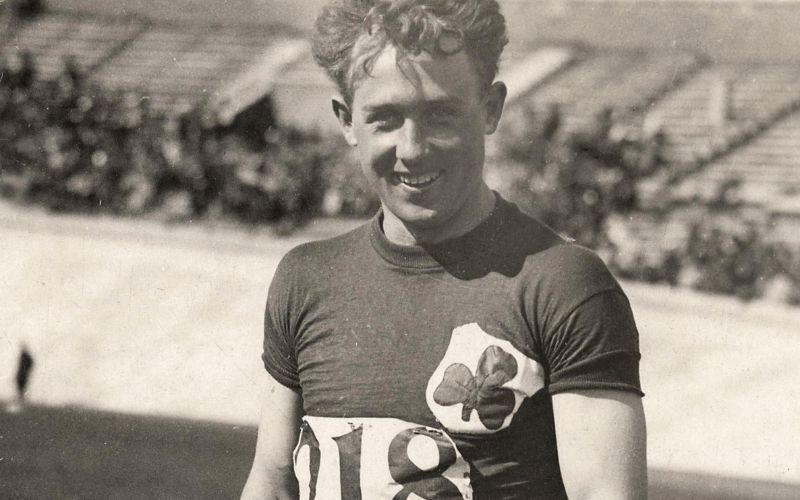
Pat O'Callaghan at the 1928 Olympic Games. (Public Domain)
Ronnie Delany
Gold medal in 1956
Ireland’s last track and field gold, Ronnie Delany’s thrilling win in the 1500m in Melbourne on December 1, 1956 remains one of the most glittering achievements in Irish sporting history.
The Dubliner was just 21 years of age, but his athletic pedigree was already well established. Earlier that year, he had run a sub-four-minute mile, becoming only the seventh man to achieve that feat.
He had been a star talent at Crusaders Athletics Club in south Dublin, and when he ran under two minutes for half a mile in 1953, he began to understand his potential.
A transformative move was his switch to America when he won a scholarship to Villanova University, later the alma mater of Sonia O’Sullivan.
There, Delany came under the coaching influence of a legendary figure called Jumbo Elliott. Elliott produced five Olympic golds between 1956 and 1968, and Delaney credited his training with his performance in the 1500m final, when he ran a superb tactical race before streaking to the front with 180 metres left, claiming a win that has resonated through the decades since.
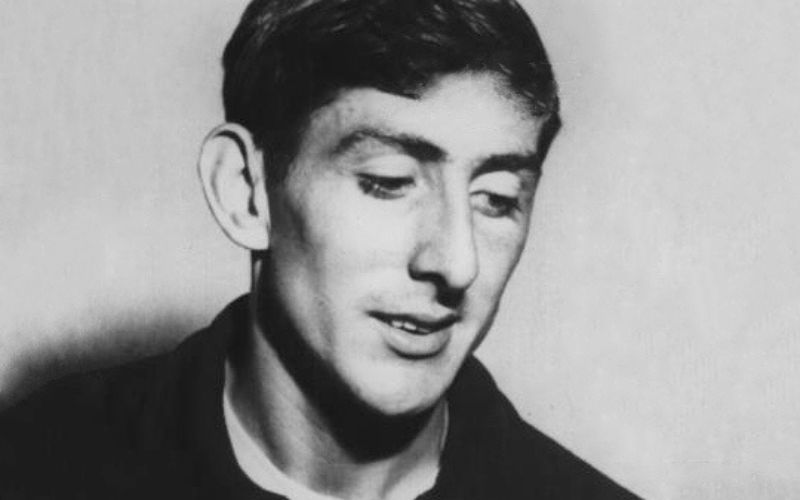
Ronnie Delany in 1957. (Public Domain)
John Treacy
Silver medal in 1984
Given the quality of the field and the baking conditions, Treacy’s silver in the marathon at the LA Games is arguably the greatest track and field performance by an Irish athlete at the Olympics.
The list of contenders toeing the line at the start of the marathon included some of the great marathoners of the age, and the race is often cited as the most competitive marathon line-up in Olympic history.
It included the world record holder (Rob de Castella of Australia), the African record holder (Juma Ikangaa of Tanzania), the home favourite (Alberto Salazar), and one of the legendary figures of the distance, the great Carlos Lopes of Portugal.
It was also the first time John Treacy, then 27 years of age, had run a marathon. More remarkable again, he had run the final of the 10,000 metres six days before the marathon and this after running the heats of the 10,000 metres three days before that.
Treacy was a brilliant talent from a young age, emerging from rural Waterford to become a twotime world cross country champion in his early 20s.
It was his performance in Los Angeles on a boiling day that made him a legend, coming second to Lopes.
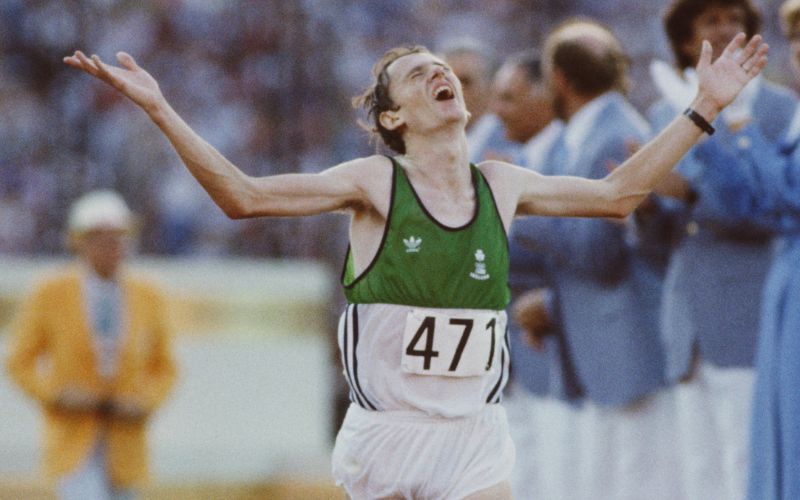
August 12, 1984: John Treacy of Ireland finishes in second place in the Men's Marathon event at the XXIII Olympic Summer Games at the Los Angeles Memorial Coliseum. (Getty Images)
Michael Carruth
Gold medal in 1992
There isn’t a more famous jump in Irish history.
The referee, Kishen Narsi of India, had barely extended Michael Carruth’s left arm when the 25-year-old was airborne, jumping in delight before, arms windmilling, he hopped around the ring.
His eventual destination was the arms of his father, Austin, his coach and inspiration, and the man whose mentorship was crucial in making his son a national hero.
Michael Carruth had just beaten Juan Hernandez of Cuba in the final of the men’s welterweight division at the Barcelona Games.
It was a classically tense Olympic boxing final, but when Carruth was penalised for holding in the second round, with three points awarded to Hernandez, it looked a fateful switch in momentum.
But Carruth was terrific against a much bigger man, and the fighters were tied going into the final round.
Carruth later recalled that he wanted to go out and try and win on the front foot, but his corner cautioned otherwise, and his patient, methodical approach paid rich dividends.
Euro ’88 and Italia ’90 had transformed support for Irish teams on the international stage, and the boxing venue, in a gritty suburb of the city, was transformed into a blur of tricolours and cries, inevitably, of ‘Olé, olé, olé, olé’.
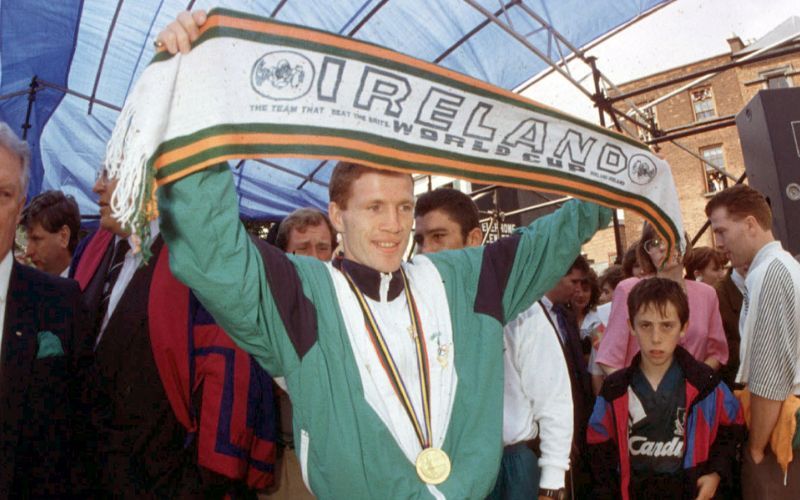
August 11, 1992: Michael Carruth at Mansion House in Dublin for the boxer's homecoming from the Olympics. (RollingNews.ie)
Sonia O'Sullivan
Silver medal in 2000
Maybe Ireland’s greatest sports star, that Sonia O’Sullivan’s Olympic highlight is not gold but silver just underlines how tough an environment it is.
Any Olympic medal is hard won, but few have come with the back story that accompanied O’Sullivan’s silver in the 5,000m in Melbourne.
She was pipped to a podium place in the 3,000 metres in Barcelona in 1992.
One of the runners that finished in front of her tested positive later in her career for a banned substance – but that was only a flavour of the injustice she suffered at the hands of dopers.
Her hopes in the 3,000 metres at the World Championships in 1993 came a cropper thanks to the infamous Ma’s Army, the procession of Chinese athletes that emerged, unheralded, and dominated the meet.
Three of them beat O’Sullivan into fourth place in that final, while she held on for silver in the 1500 metres.
In those years, she was one of the outstanding middle-distance runners in the world, but the Atlanta Olympics in 1996 were a disaster for the Cobh athlete.
Debilitated by a stomach bug, she failed to finish the final of the 5,000 metres, and didn’t get out of the heats in the 1500 metres.
That made her rebound four years later all the more commendable, as a world-class talent found her rightful place on an Olympic podium.
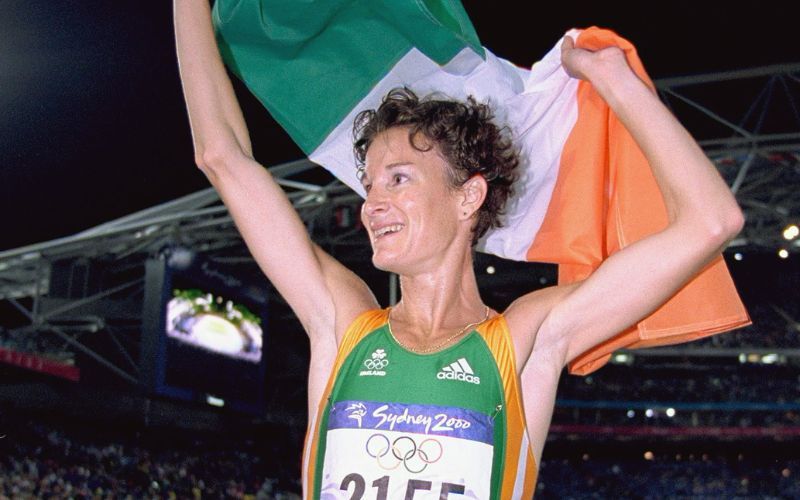
September 25, 2000: Sonia O'Sullivan celebrates winning Silver in the Womens 5000m Final at the Olympic Stadium on Day Ten of the Sydney 2000 Olympic Games. (Getty Images)
The Beijing Boxers
One Silver medal and two Bronze medals in 2008
One of the enduring memories from the Workers’ Gymnasium in Beijing was the sight of Gary Keegan far away from the action.
The man who had built the Irish high performance system was another victim of the dysfunction that runs through Irish amateur boxing like DNA; his accreditation kept him away from the fighters whose careers he had helped to shape.
Yet 2008 was also the Olympics at which the years of work by Keegan and Billy Walsh, then head coach, came to fruition. They were the story of the Games, making heroes of Kenny Egan, Paddy Barnes, and the late Darren Sutherland, as all three finished with medals. The latter two collected bronzes while Egan, the boxing team’s inspirational leader, reached the final where he lost narrowly to a home fighter.
Their lives took some fateful twists thereafter and in the case of Sutherland, a desperately tragic one; he was found dead 13 months after his Olympic medal as he tried to build a career in the professional ranks.
Egan overcame enormous personal challenges in the months after Beijing, too, while the Irish high performance system remained vulnerable to the petty politicking that has blighted the sport.
Walsh left in October 2015 after overseeing four more medals at the 2012 Games.
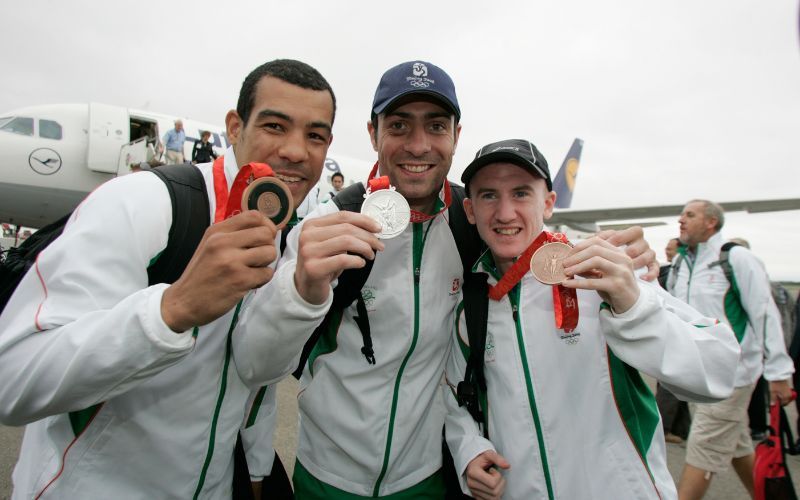
August 26, 2008: Darren Sutherland, Kenny Egan, and Paddy Barnes after returning home from the Olympics in Beijing. (RollingNews.ie)
The O'Donovan Brothers
Silver medal in 2016
Remember when their stupefied Irishmen shtick had half the world duped? Colleagues from other countries would approach Irish journalists in Rio and ask if the two brothers from Cork were really as they appeared?
The answer was, of course, no: they put on an act that charmed the cameras and also kept the media at a safe distance. They talked about pulling like dogs, as if becoming Olympic medallists was just a matter of unthinking effort. But it was lapped up, and the remarkable brothers from Skibbereen got to enjoy Olympic glory on their terms.
Behind their success was the story of what Paul and Gary O’Donovan had sacrificed to make the second step on the rostrum. It also pushed the brilliant story of Skibbereen Rowing Club into national prominence as a small, unassuming group in a quiet corner of west Cork integrated high performance into everything they do.
The brothers’ partnership would eventually be broken up, and Paul paired with another Skibb talent, Fintan McCarthy, to take gold in Tokyo. But in 2016, the country had seen nothing like them. Rowing had seen nothing like them.
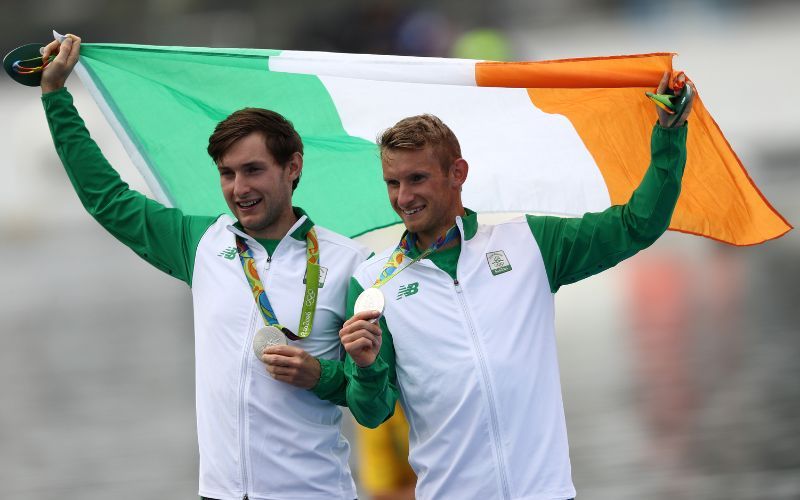
August 12, 2016: Silver medalists Paul O'Donovan (L) and Gary O'Donovan (R) celebrate after the medal ceremony for the Lightweight Men's Double Sculls at the Rio 2016 Olympic Games. (Getty Images)
Paul O'Donovan and Fintan McCarthy
Gold medal in 2020 [2021]
In the months after their silver in Rio, the O’Donovans were hot property. They were sought out by TV companies and sponsors; they appeared on Graham Norton’s New Year’s Eve show.
T-shirts emblazoned with their wisdom were popular. One chap approached Paul in a Skibbereen nightclub and proudly displayed the tattoo that ran the length of his forearm: "Pull like a dog."
There was no danger of the two getting pulled into the vortex of fame, though. They remained high achievers in the sport, and in the lead-up to Tokyo, Paul’s partnership with Fintan McCarthy in the lightweight doubles revealed the brutal pragmatism that governs sport at this level.
Gary may have been his brother, and the man who he made history with in Rio in winning Ireland’s first Olympic rowing medal, but form dictated all.
Those in charge of the high-performance system saw the potential in the partnership between Paul and Fintan McCarthy, and their call was richly rewarded when they claimed a terrific gold.
The pair are targeting gold again in Paris. If they manage it, Paul O’Donovan will be Ireland’s greatest Olympian.

July 29, 2021: Gold medalists Fintan Mccarthy and Paul O'Donovan (R) with their medals after the Lightweight Men's Double Sculls Final A at the Tokyo 2020 Olympic Games. (Getty Images)
Kellie Harrington
Gold medal in 2020 [2021]
The years since have brought controversy, some of her own making, and at one point it looked as though she might even face a showdown with former team-mate Amy Broadhurst after her dramatic switch to Team GB.
But in Tokyo three years ago, Kellie Harrington was the star of the Irish show.
She was one of a number of brilliant talents in Irish women’s boxing whose achievements and ambitions had been, if not overlooked, then certainly obscured by the enormous shadow cast by Katie Taylor. With the latter turning professional after the horrible time she endured in Rio, though, Harrington carried the boxing hopes into Tokyo.
She delivered, too – and did so despite the enormous focus on her but also on her personal life and her background. Born and raised in a part of Dublin’s north inner city beset by problems, Harrington was a tribute to her upbringing and the power of sport. She was a brilliant ambassador for her city, but also for her country.

August 10, 2021: Kellie Harrington with her medal upon returning to Ireland from the Tokyo Olympic Games. (RollingNews.ie)
Katie Taylor
Gold medal in 2012
From the moment in 2009 when the decision was announced to include women’s boxing at the 2012 Olympics, the pressure on Katie Taylor was instant and unyielding.
There is archive footage of the then 22-year-old being interviewed on RTÉ, with her status as favourite for an Olympic medal mentioned within seconds.
By then, she was already a multiple European champion and had conquered the world stage, too.
Attitudes to women’s boxing were, in places, still rooted in hopeless sexism, but Taylor’s popularity in Ireland was already enormous. In the years up to London, her form remained unimpeachable, and by the time the Olympics started, her progress to expected gold was avidly followed by the nation.
She made good on the hype, defeating Russian Sofya Ochigava in the final. Ochigava had been dismissive of Taylor’s reputation in the build-up, suggesting she was just another fighter.
It was, in truth, a sensible enough tactic from an unfancied fighter who was desperate not to appear cowed by an illustrious opponent, but it was taken as a grave insult here.
Taylor remained unmoved, winning gold and sealing her place as the nation’s most treasured sporting figure.

August 9, 2012: Katie Taylor celebrates at the London 2012 Olympic Games. (Getty Images)
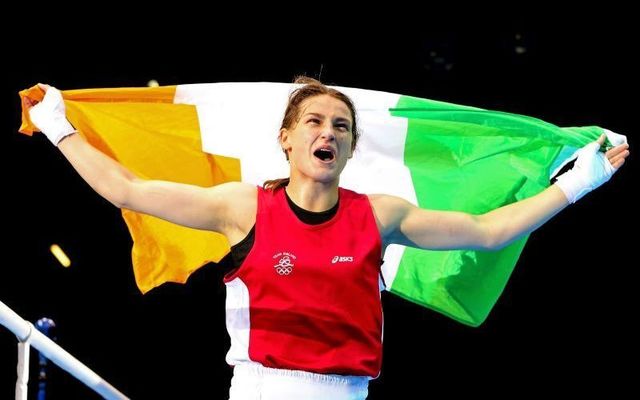

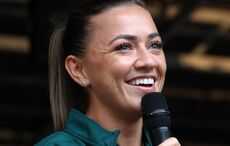
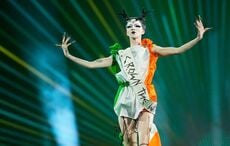
Comments